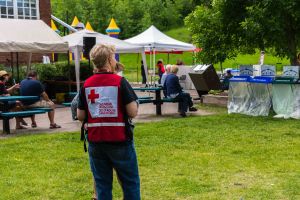This year’s theme is, “Be Prepared. Grow Your Community of Support.” Preparing for an emergency situation can seem overwhelming and expensive, but it doesn’t have to be. Follow the guide below to prepare yourself and your household for an emergency, while looking out for and drawing support from your neighbours.
Here are some important steps you can take to being prepared:
Know the Risks in Your Community
Throughout Canada, there are many hazards that can impact communities and neighbourhoods. From wildfires, floods, ice storms, and power outages, understanding how you and your community are at risk can help you prepare.
Credit: John Falcon / Canadian Red Cross
Start by thinking about what type of emergencies could happen where you live. Your geographic location, home type, and household needs can all influence how you should prepare.
Ask yourself:
- Do you live in a high-rise, basement suite, or house?
- Are there children, seniors, or individuals with health or mobility challenges in your household?
- Do you live alone or with others?
- Do you know your neighbours or have any local contacts who could support you in an emergency?
To learn more about local risks, contact your city or town to find out what hazards are most common in your region and what emergency plans are in place. Additional resources can be found at getprepared.ca.
Put Together an Emergency Plan
Having an emergency plan in place can save time and stress in an emergency. A solid emergency plan should include important details such as:- Health card and passport numbers
- Insurance information
- Emergency contact numbers
- A designated family meeting spot

Credit: Canadian Red Cross
Tip: Keep a printed copy of your emergency plan at home, in your car, and saved on your phone or tablet. The Canadian Red Cross recommends reviewing and updating your plan at least once a year.
Get started: For a comprehensive emergency plan, download our emergency plan template available in 12 different languages for free at Make an Emergency Plan.
Prepare an Emergency Kit
Having an emergency kit prepared in advance helps save time during emergencies and disasters. Before purchasing any items, start by checking what you already have at home. Make a list of items you need and keep it with you so you can grab them when they’re on sale.Some essential items your kit should include:
- Water
- Non-perishable food
- Can opener
- Cell phone with charger or battery pack
- A copy of your emergency plan
- Essential medications and items for babies and pets
- Flashlight and batteries
- Copies of ID, passport, and insurance
Spreading out your purchases over time can help manage the costs, and you can also ask family and friends if they have any spare items they are willing to give you.
It’s also helpful to be aware of local community services that may offer support before, during, or after an emergency. Many communities have resources like community centres and food banks that can assist with basic needs.
Download an emergency kit checklist for free or consider purchasing a ready-to-go emergency kit online. Check out this post that features some budget friendly items to include in your emergency kit.
Connect with your Neighbours and Community
In an emergency situation, neighbours are often the first people we can turn to, and the first people who may turn to us. Taking the time to get to know your neighbours and understand how you can support each other in the event of an emergency or disaster is an important step for preparedness and building a more connected community.Community support goes both ways, whether it’s sharing resources, checking in during a power outage, or helping someone evacuate their home, strong neighbourly connections can make a big difference and serve as a trusted line of support.
Creating a sense of community and knowing where services and resources are located can help increase our resiliency.
Attend an Emergency Preparedness Event Near You
Attending a local event is a great way to prepare for an emergency or disaster and get informed about emergency planning. These in-person events offer an opportunity to learn, ask questions, and connect with your community.
Credit: J. Keith Howie / Paragon Corporation Inc. / Canadian Red Cross
During Emergency Preparedness Week, many municipalities and organizations host public events that are free and provide tips and tools for households. Check your local community website to see if there is an event near you or contact DRRCCA@redcross.ca to invite us to your next preparedness event.
The Canadian Red Cross is pleased to be participating in the public events below this Emergency Preparedness Week.
Ontario
Town of Bradford West Gwillimbury | Spring into Safety Open House
When: Wednesday, May 7, 2025, from 4:00 p.m. to 6:00 p.m.Where: Fire Station 1 (77 Melbourne Drive Bradford West Gwillimbury, ON).
More information on this event can be found here.
Alberta
Get Ready in the Park | City of Edmonton
When: Saturday, May 10, 2025, from 10:00 a.m. to 3:00 p.m.Where: Edmonton Expo Centre
More information on this event can be found here.
Municipality of Jasper | Preparing for Wildfire
When: Wednesday, May 7, 2025, from 3:00 p.m. to 7:00 p.m.Where: Fire Hall (Emergency Services Building).
More information can be found here.

